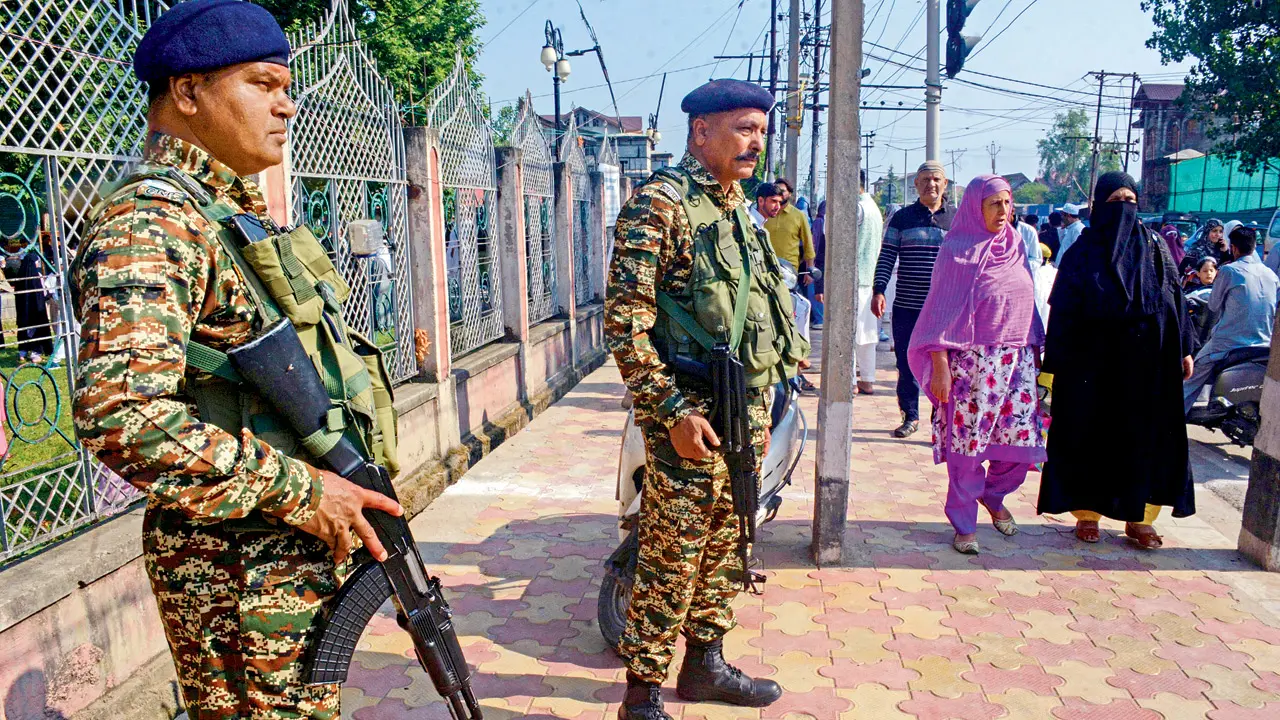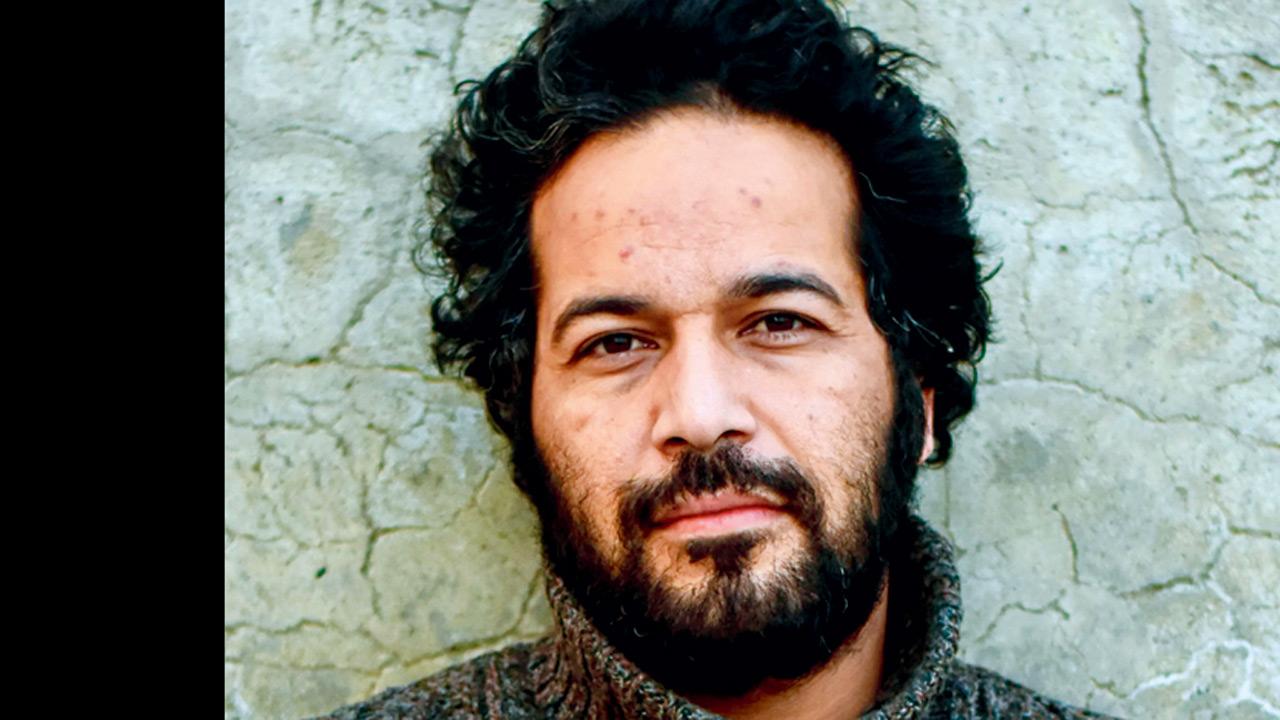by Ajaz Asaf, Mid-Day, Mumbai, June 9, 2025
The Srinagar native’s short story collection, The World With Its Mouth Open, stirs readers’ conscience while vividly depicting the lives of characters who appear broken in a world unhinged by a bloody past

Security personnel stand guard outside Eidgah ground as people arrive to offer prayers at Aali Masjid on the occasion of Eid-ul-Azha, in Srinagar, Jammu and Kashmir on June 7. Pic/PTI
 In Zahid Rafiq’s The World With Its Mouth Open, a collection of 11 short stories, not a single bullet is fired, nor does a person die. Yet the scars of violence, deeper than wounds, can be seen in each of these stories; fear, even terror, looms; and protagonists appear broken in a world unhinged by a bloody past. Seldom has violence been depicted as non-violently, and so chillingly, as Rafiq has in The World.
In Zahid Rafiq’s The World With Its Mouth Open, a collection of 11 short stories, not a single bullet is fired, nor does a person die. Yet the scars of violence, deeper than wounds, can be seen in each of these stories; fear, even terror, looms; and protagonists appear broken in a world unhinged by a bloody past. Seldom has violence been depicted as non-violently, and so chillingly, as Rafiq has in The World.
The 11 stories unfold in a land that is not named. But you know it’s Kashmir because a biographical line on Rafiq says he lives in Srinagar, and because of occasional references to famous landmarks such as Nishat Bagh and Lal Chowk. You know it’s Kashmir also because a gaggle of journalists, in In Small Boxes, gather at tea shops, smoke cheap cigarettes, and discuss literature and politics. The story’s narrator recollects he didn’t know much about either, and neither did most of them, “so we said whatever came to us, as long as we agreed that Kashmir must become free.”
But Kashmir isn’t or doesn’t feel free to the poet-academic who, in Bare Feet, finds that every neighbourhood of the city in which he grew up has “nothing but bunkers made of sandbags with loops of barbed wires wound around, and from little holes in the bunkers, dark eyes watch you with pointed barrels. They are everywhere, the bunkers, the blind eyes, the searching muzzles.”
Zahid Rafiq, the author of The World With Its Mouth Open, a collection of 11 short stories that unfold in Kashmir. Pic/Muzamil Mattoo
The presence of soldiers is forbidding in The World, even in their absence. A schoolboy about to be beaten by his teacher wishes the soldiers “could barge in again in their big boots, turning everything upside down, poking even into the schoolbags with the long guns.” Their raid could save him from the punishment, but he knows the “soldiers wouldn’t come today.”
Beaten the boy is, with nettle used on his body, as he begs for mercy. The boy would rather be on the football field than in the school. He struggles to meet the expectations of his family — and undergoes punishment daily. Is the boy’s fate a metaphor for Kashmir’s, condemned to suffer because its quests are different from those of the rest of India?
Such questions keep surfacing as we turn the pages of The World, for we cannot but bring to our reading a priori knowledge about Kashmir. We are not told about the identity of those to whom the “dark eyes” in bunkers belong. What we do know is that they are deployed there because there’s a “war” afoot. A war that has silenced a father as well as a person who’s “carrying his dead brother in him, and carrying maybe the dying country too.” This is the war that is a “thousand plagues put together, picking the young, leaving the old to bury them.”
Rafiq will not tell what the war was or is about. He merely paints its consequence on the characters in his stories, through finely etched episodes from their quotidian existences. There’s no resolution of the plot at the end of each story. The past made their present, fashioning them into who they are today — who they might remain in the future. They suffer as they seek to negotiate their torrid reality. Their sorrow and befuddlement weigh heavy on them — and on us as well.
In The Bridge, a pregnant woman sees a man on the bridge, staring into the river. On realising he is her childhood friend’s brother, she greets him. He says he is there for a rendezvous with another person — but, oddly, accompanies the woman to buy fish. They buy one and then, suddenly, he disappears into the labyrinthine market. Why did the man abandon her? Who was he to meet at the bridge? Is the story a metaphor for a Kashmir of inexplicable disappearances, of people with double lives, of premature, violent deaths?
In The House, one of the workers digging trenches for laying its foundation stumbles upon a severed hand. How did the hand come there? Where is the rest of the body? Should they dig deeper to probe what might still lie underneath? Yes, says the young worker who found the hand. No, argue the husband-wife duo who are constructing their dream house. Idealism is pitted against pragmatism. We sense Kashmir’s present and future will have its darkled past as their foundation; memory will struggle against forgetting.
Among all the stories, the one with the most metaphorical appeal is Beauty, which is presumably the nickname of a girl — she’s indeed beautiful but seems “to be somewhere else” all the time. Boys are smitten by her. They dream of romancing her until two of them get a glimpse of her in her private moment — and discover her beauty masks unutterable anguish. They recoil at the sight of her, as we too do on reading Rafiq, glimpsing in his stories the sorrow of the land so blindingly enchanting to us, as also our complicity in its suffering. You must read The World to check whether it makes you feel guilty for what has been done to Kashmiris. That’s the path to redemption for you and I.
The writer is a senior journalist and author of Bhima Koregaon: Challenging Caste
Send your feedback to
The views expressed in this column are the individual’s and don’t represent those of the paper.
